【单元一遍过】牛津译林版八年级上册Unit 5 Wild animals复习课件(共32张PPT)
文档属性
| 名称 | 【单元一遍过】牛津译林版八年级上册Unit 5 Wild animals复习课件(共32张PPT) | 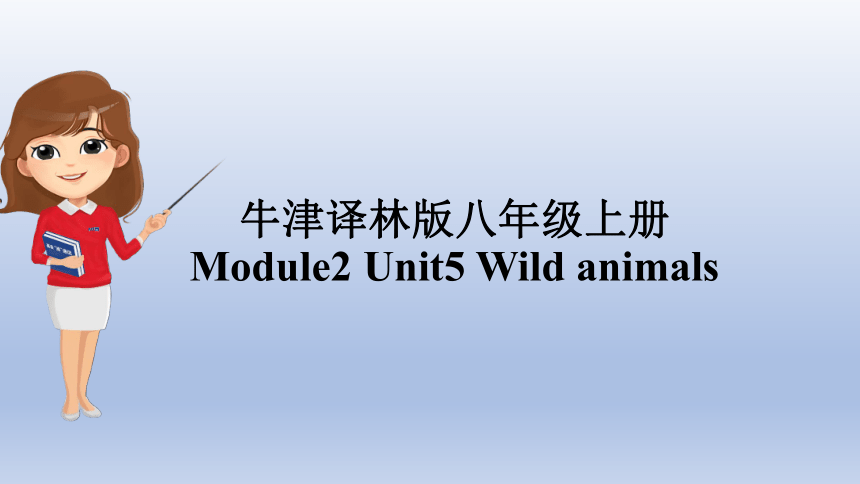 | |
| 格式 | pptx | ||
| 文件大小 | 1.2MB | ||
| 资源类型 | 教案 | ||
| 版本资源 | 牛津译林版 | ||
| 科目 | 英语 | ||
| 更新时间 | 2023-07-15 15:07:53 | ||
图片预览

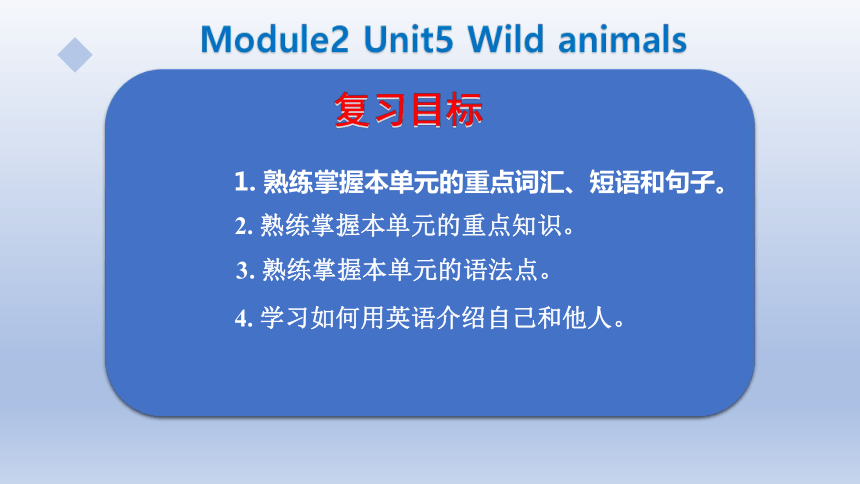

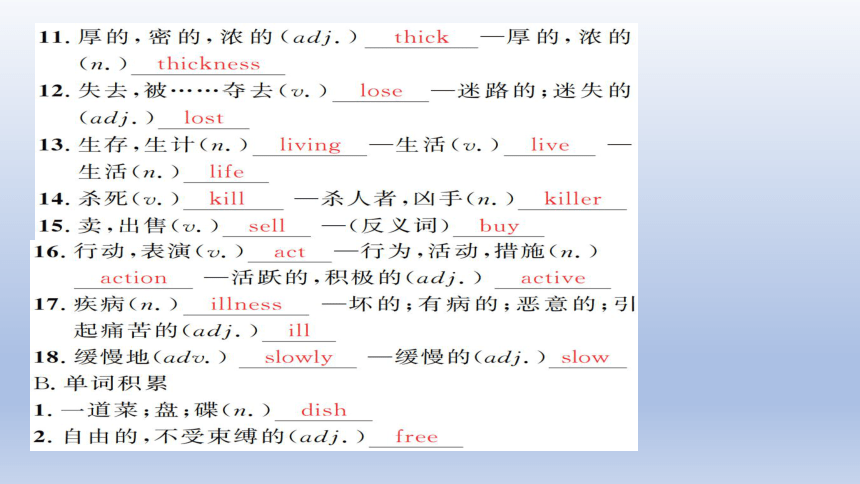
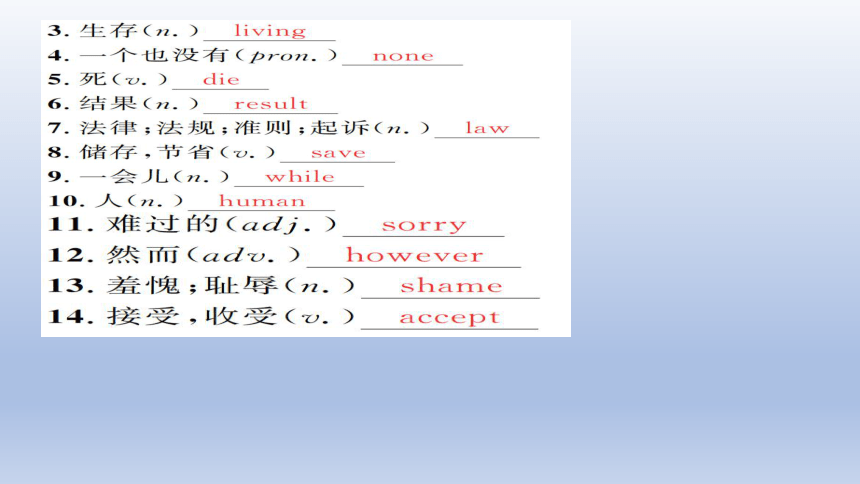
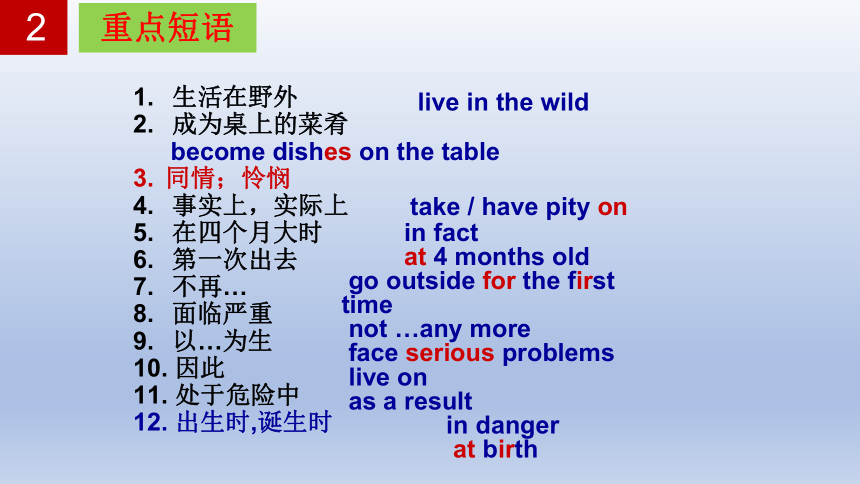
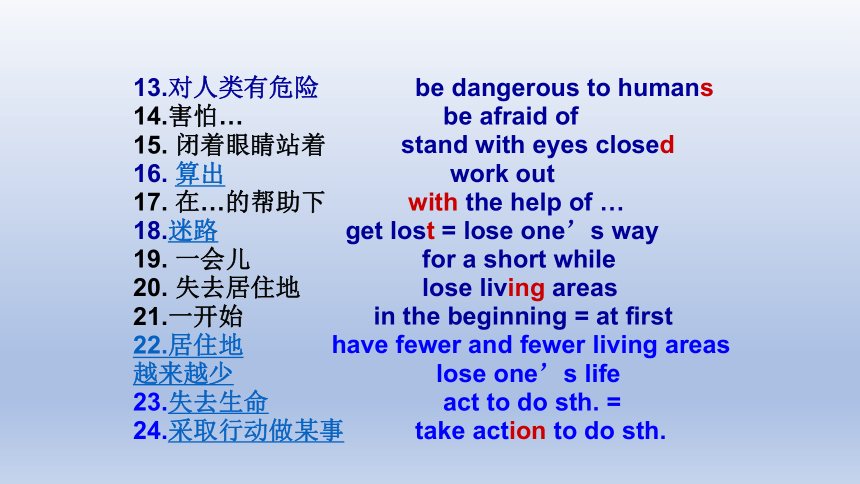
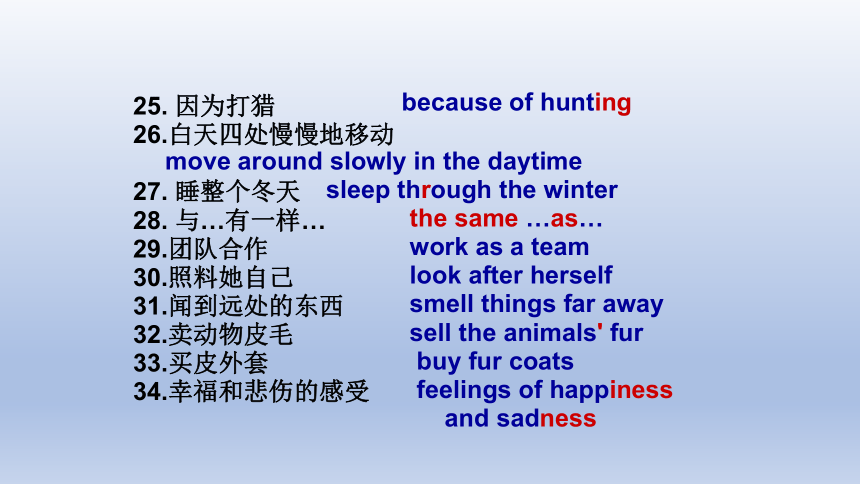
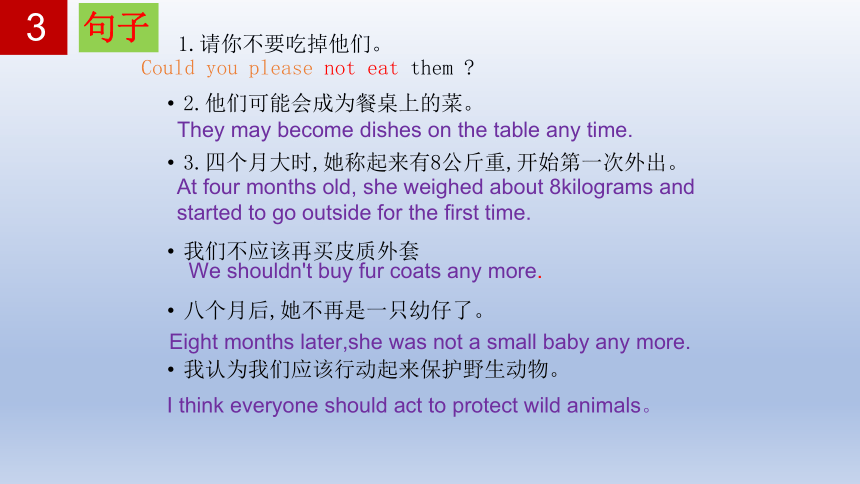
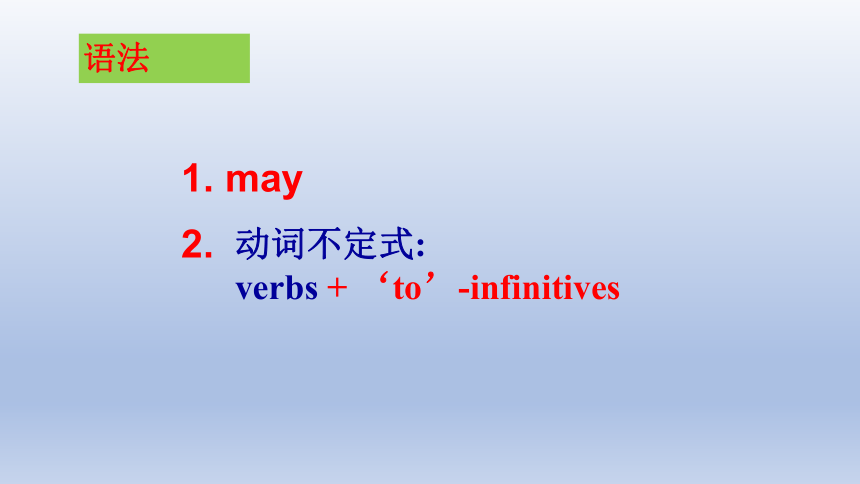
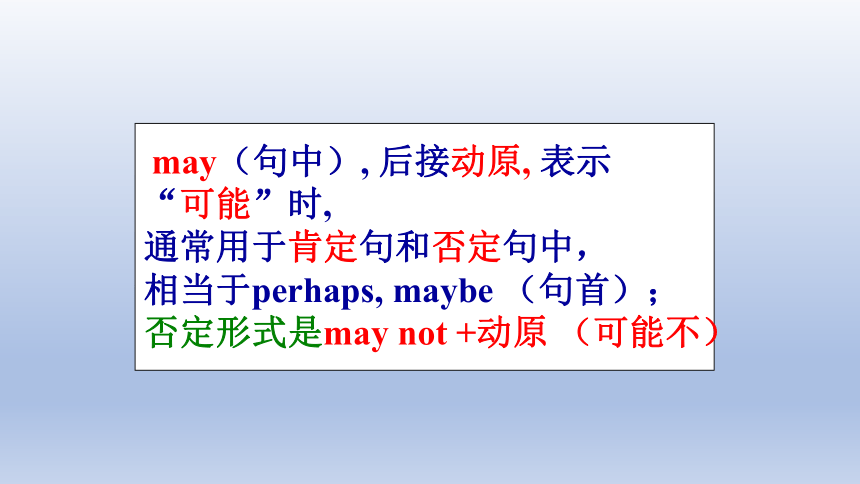
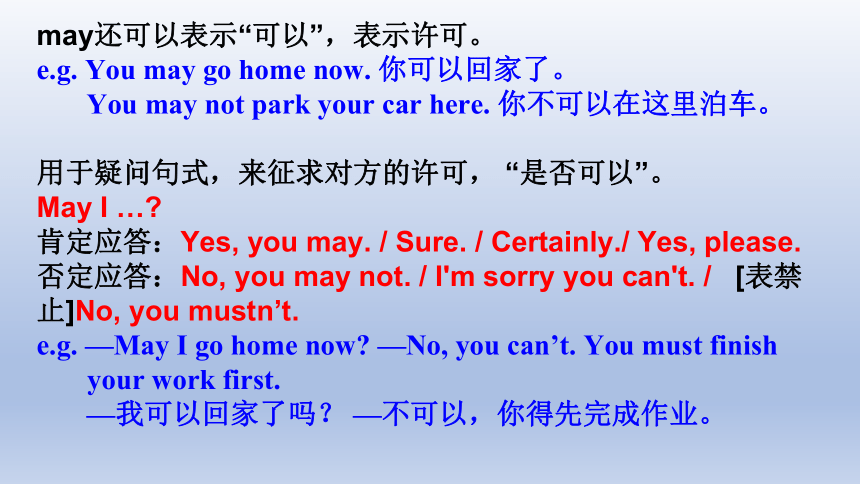
文档简介
(共32张PPT)
牛津译林版八年级上册
Module2 Unit5 Wild animals
目录页
1、单击此处添加标题
2、单击此处添加标题
3、单击此处添加标题
4、单击此处添加标题
5、单击此处添加标题
复习目标
1. 熟练掌握本单元的重点词汇、短语和句子。
3. 熟练掌握本单元的语法点。
4. 学习如何用英语介绍自己和他人。
2. 熟练掌握本单元的重点知识。
Module2 Unit5 Wild animals
1
重点单词
生活在野外
成为桌上的菜肴
同情;怜悯
事实上,实际上
在四个月大时
第一次出去
不再…
面临严重
以…为生
因此
处于危险中
出生时,诞生时
live in the wild
become dishes on the table
take / have pity on
in fact
at 4 months old
go outside for the first time
not …any more
face serious problems
live on
as a result
in danger
at birth
重点短语
2
13.对人类有危险
14.害怕…
15. 闭着眼睛站着
16. 算出
17. 在…的帮助下
18.迷路
19. 一会儿
20. 失去居住地
21.一开始
22.居住地
越来越少
23.失去生命
24.采取行动做某事
be dangerous to humans
be afraid of
stand with eyes closed
work out
with the help of …
get lost = lose one’s way
for a short while
lose living areas
in the beginning = at first
have fewer and fewer living areas
lose one’s life
act to do sth. =
take action to do sth.
because of hunting
move around slowly in the daytime
sleep through the winter
the same …as…
work as a team
look after herself
smell things far away
sell the animals' fur
buy fur coats
feelings of happiness
and sadness
25. 因为打猎
26.白天四处慢慢地移动
27. 睡整个冬天
28. 与…有一样…
29.团队合作
30.照料她自己
31.闻到远处的东西
32.卖动物皮毛
33.买皮外套
34.幸福和悲伤的感受
Could you please not eat them
1.请你不要吃掉他们。
2.他们可能会成为餐桌上的菜。
3.四个月大时,她称起来有8公斤重,开始第一次外出。
我们不应该再买皮质外套
八个月后,她不再是一只幼仔了。
我认为我们应该行动起来保护野生动物。
They may become dishes on the table any time.
At four months old, she weighed about 8kilograms and started to go outside for the first time.
We shouldn't buy fur coats any more.
Eight months later,she was not a small baby any more.
I think everyone should act to protect wild animals。
3
句子
may
动词不定式:
verbs + ‘to’-infinitives
语法
may(句中), 后接动原, 表示
“可能”时,
通常用于肯定句和否定句中,
相当于perhaps, maybe (句首);
否定形式是may not +动原 (可能不)
may还可以表示“可以”,表示许可。
e.g. You may go home now. 你可以回家了。
You may not park your car here. 你不可以在这里泊车。
用于疑问句式,来征求对方的许可, “是否可以”。
May I …
肯定应答:Yes, you may. / Sure. / Certainly./ Yes, please.
否定应答:No, you may not. / I'm sorry you can't. / [表禁止]No, you mustn’t.
e.g. —May I go home now —No, you can’t. You must finish your work first.
—我可以回家了吗? —不可以,你得先完成作业。
“to + 动词原形”的结构,我
们把这种结构称为动词不定式(有时
可以不带to)。动词不定式没有人称
和数的变化,在句子中不能单独作谓
语,其否定形式是“not to + 动词原形”。
什么是动词不定式(‘to-infinitives’)?
1. At four months old, she weighed about
eight kilograms and ____________
outside for the first time.
2. When she was six months old, she
___________ bamboo.
3. When she was 20 months old, she
____________ after herself.
started to go
began to eat
learnt to look
1)动词不定式作宾语
后面能接不定式作宾语的动词有很多,如agree, ask, choose, decide, forget, remember, hope, learn, want, wish, would like, prepare, fail, start, begin, plan, try, seem, promise,refuse等。
2) 有些动词跟不定式与 跟动名词作宾语含义不同:
记住要做某事 remember to do sth ;
记得曾经做过某事remember doing sth
忘记要做某事 forget to do sth
忘记曾经做过某事forget
3.动词不定式的否定形式
动词不定式的否定式是在to前加not;不带to的不定式则在动词前加not。
1. 当我们猜测某件事发生的可能性时,常
用may来表示“也许”、“可能”。
2. 当句子中已经有谓语动词,而我们又要
表达不止一个动作概念时,其余的动词
可以使用非谓语形式表达。动词不定式
就是动词的一种非谓语形式,其肯定形
式是“to + 动词原形”,其否定形式是
“not to + 动词原形”。无人称、数和时态
的变化。
Reflection
agree to do sth. 同意做
begin to do sth. 开始做
can’t wait to do迫不及待做
decide to do sth. 决定做
fail to do sth. 做某事失败
forget to do sth. 忘记做
hope to do sth. 希望做
learn to do sth. 学着做
用不定式做宾语的动词(要熟记):
need to do 需要做
plan to do sth. 计划做
prepare to do sth. 准备做
remember to do. 记得做
start to do 开始做
try to do sth. 尝试做
want to do. 想要做
would like to do 想要做
to learn
to do
to take
work
to come
1. What are you going to choose ______ (do)
用所给词的适当形式填空
4. Mr Green’s planning _______ (take) his students to go on an outing.
3. We can go horse ________ (ride) in Inner Mongolia.
2. Simon decided ________ (learn) Maths by himself.
5. The boss makes his workers _______ (work) for over eight hours a day.
6. He is always the first _______(come) to school.
riding
堂清巩固
三. 完成句子。
1. 他可能认识你。
He _________ you.
2. 他们可能下周去长城。
They _________ the Great Wall next week.
3. 我们同意马上离开。
We agreed ________ at once.
4. Laura计划到中国一些名胜之地旅游。
Laura ____________ some places of
interest in China.
5. 你愿意和他一起工作吗?
Would you _____________ with him
like to work
plans to visit
to leave
may know
may go to
1. Would you like to live in the wild 你想生活在野外吗? P56
would like (sb) to do sth. = want (sb) to do 想要(某人)做某事
would like sth = want sth 想要某物
[注意]疑问句写法:
Would you like (sb.) to do… =Do you want (sb.) to do…
e.g. Would you like to have a short rest 你稍微休息一下如何啊?
2. So could you please not eat them 因此你可以不吃它们吗? P56
Can/Could/Would you please + 动词原形?
请你..., 好吗?
其否定式是在 please 后直接加 not,
e.g. Could you please not park your car here 你能不把车停在这里吗?
常见错误是在动词前面加to,或使用don’t。如:
[错误] Would you please not to stand in my way
[错误] Could you please don’t eat them
重点知识点
3. I may die without them. 没有了它们我 可能会死的。P56
without +名词/代词 没有;不和…在一起,没有…的陪伴;不使用,不带
There is no smoke without fire。无风不起浪。
He found the place without difficulty.他不费力找到了 那个地方。
Don’t go without me.不要不带我去。
Don’t go out without your coat.不穿大衣别出去。
without +动名词 不做….,在不…情况下
He left without saying goodbye.他不辞而别。
[填空]他没有告诉他母亲就离开了家。
He left home without telling his mother.
4. When Xi Wang was born, she weighed 100 grams and …“希望”出生时,称重只有100克,…
weigh vi. 称重
如:这头大象重2吨。The elephant weighs 2 tons.
weight n. 重量
如:这头大象重2吨。
The weight of the elephant is 2 tons.
= The elephant is 2 tons heavy.
对重量的提问:
1)用how heavy How heavy is the elephant
2)用how much How much does the elephant weigh
6. However, we do believe that where there is Xi Wang, there is hope.我们坚信,有“希望”在,我, 就有希望。P58
1)句中的do是助动词,后接动词原形,用来强调。
e.g. I do know that Mum loves me, but I just…我确实知道妈妈是爱我的,可我就是……
2) 本句套用了一个成语:
Where there is a will, there is a way.有志者事竟成。这里的where引导了一个地点状语从句,译为 “在/到……的地方”。
e.g. Sit where I can see you. 坐在我能见到你的地方。
本单元的写作话题是围绕着写一份关于濒危动物的报告而展开的。报告的目的性很明确,不但要保证观点陈述的客观性,而且要简明扼要;一般用第三人称来写,通过对真实信息的筛选来陈述自己的观点。那么如何写好一份关于濒危动物的报告呢?
首先,要找出相关的客观信息。我们可以通过参考书或网络获取信息,并做好笔记。其次,要将笔记转化为文章。一般用陈述句的形式来写一份报告,内容要包括题目、正文和结尾。题目用一些醒目的句子,如:Tigers are in danger!正文可以从appearance,ability,character,danger等方面讲。最后以号召性语句写出结尾,以达到报告的目的。
单元写作
教材中出现的相关句型:
1.They're strong and they can run very fast.他们很强壮,能快速奔跑。
2.It is very difficult for pandas to have babies and many baby pandas die when they are young.对熊猫而言孕育宝宝很困难,许多熊猫宝宝很小就死了。
3.However,the bamboo forests are becoming smaller and smaller.然而,竹林正变得越来越小。
4.As a result,pandas may not have a place to live or food to eat.因此,熊猫可能会没地方住,没食物吃。
5.They sell the animals' fur,bones or other parts of the body.他们卖掉动物的皮毛、骨头或身体的其他部分。
6.They eat meat/fish/plants/insects...他们吃肉/鱼/植物/昆虫……
7.If we do nothing,soon there may be none left!如果我们什么都不做,很快世界上就一只熊猫也不剩了!
请根据下列表格,写一篇关于大象的报道,呼吁大家采取措施来保护野生动物。
要求:1.字迹整洁;2.词数70左右。
Appearance big,strong,grey,long trunks and tusks
Ability poor eyesight,good hearing and smell,lift heavy things
Character friendly
Danger people hunt them for their tusks
A report about elephants
Elephants are very big and strong.They are grey and have long trunks and tusks.Elephants have poor eyesight,but they have good hearing and smell.They can lift heavy things and are very friendly to each other.
However,many people don't know the importance of protecting elephants.The number of elephants is smaller and smaller.If people keep taking their land,elephants will have nowhere to live.Also,we must stop people hunting them for their tusks.If we do not take action,there will be no elephants left in the world.In order to keep the balance of nature,we should try our best to protect wild animals and our environment.
【点评】本文是一篇关于濒危动物——大象的报告。文章首先描写大象的外貌特征,具备的能力;然后介绍大象的生活特点,危险的处境;最后号召大家采取保护措施。整篇文章主题鲜明突出,条理清楚;语言丰富,富于变化。
根据下表信息,以“Tigers are in danger!”为题用英语写一篇70词左右的报告。
Tigers are in danger!
Tigers are big and strong.They have bright eyes.They also have yellow fur with black stripes and look beautiful.They can run fast,but only for a short while.They are able to swim and climb.They are good at hunting other animals.They usually live alone.But when they have babies,they live as a family.Tigers are in danger because hunters catch them for their fur,bones or other parts of the body.There are only about 3,200 tigers in the world now.Their number is getting smaller and smaller.If we don't protect them,soon there will be no tigers in the world.
牛津译林版八年级上册
Module2 Unit5 Wild animals
目录页
1、单击此处添加标题
2、单击此处添加标题
3、单击此处添加标题
4、单击此处添加标题
5、单击此处添加标题
复习目标
1. 熟练掌握本单元的重点词汇、短语和句子。
3. 熟练掌握本单元的语法点。
4. 学习如何用英语介绍自己和他人。
2. 熟练掌握本单元的重点知识。
Module2 Unit5 Wild animals
1
重点单词
生活在野外
成为桌上的菜肴
同情;怜悯
事实上,实际上
在四个月大时
第一次出去
不再…
面临严重
以…为生
因此
处于危险中
出生时,诞生时
live in the wild
become dishes on the table
take / have pity on
in fact
at 4 months old
go outside for the first time
not …any more
face serious problems
live on
as a result
in danger
at birth
重点短语
2
13.对人类有危险
14.害怕…
15. 闭着眼睛站着
16. 算出
17. 在…的帮助下
18.迷路
19. 一会儿
20. 失去居住地
21.一开始
22.居住地
越来越少
23.失去生命
24.采取行动做某事
be dangerous to humans
be afraid of
stand with eyes closed
work out
with the help of …
get lost = lose one’s way
for a short while
lose living areas
in the beginning = at first
have fewer and fewer living areas
lose one’s life
act to do sth. =
take action to do sth.
because of hunting
move around slowly in the daytime
sleep through the winter
the same …as…
work as a team
look after herself
smell things far away
sell the animals' fur
buy fur coats
feelings of happiness
and sadness
25. 因为打猎
26.白天四处慢慢地移动
27. 睡整个冬天
28. 与…有一样…
29.团队合作
30.照料她自己
31.闻到远处的东西
32.卖动物皮毛
33.买皮外套
34.幸福和悲伤的感受
Could you please not eat them
1.请你不要吃掉他们。
2.他们可能会成为餐桌上的菜。
3.四个月大时,她称起来有8公斤重,开始第一次外出。
我们不应该再买皮质外套
八个月后,她不再是一只幼仔了。
我认为我们应该行动起来保护野生动物。
They may become dishes on the table any time.
At four months old, she weighed about 8kilograms and started to go outside for the first time.
We shouldn't buy fur coats any more.
Eight months later,she was not a small baby any more.
I think everyone should act to protect wild animals。
3
句子
may
动词不定式:
verbs + ‘to’-infinitives
语法
may(句中), 后接动原, 表示
“可能”时,
通常用于肯定句和否定句中,
相当于perhaps, maybe (句首);
否定形式是may not +动原 (可能不)
may还可以表示“可以”,表示许可。
e.g. You may go home now. 你可以回家了。
You may not park your car here. 你不可以在这里泊车。
用于疑问句式,来征求对方的许可, “是否可以”。
May I …
肯定应答:Yes, you may. / Sure. / Certainly./ Yes, please.
否定应答:No, you may not. / I'm sorry you can't. / [表禁止]No, you mustn’t.
e.g. —May I go home now —No, you can’t. You must finish your work first.
—我可以回家了吗? —不可以,你得先完成作业。
“to + 动词原形”的结构,我
们把这种结构称为动词不定式(有时
可以不带to)。动词不定式没有人称
和数的变化,在句子中不能单独作谓
语,其否定形式是“not to + 动词原形”。
什么是动词不定式(‘to-infinitives’)?
1. At four months old, she weighed about
eight kilograms and ____________
outside for the first time.
2. When she was six months old, she
___________ bamboo.
3. When she was 20 months old, she
____________ after herself.
started to go
began to eat
learnt to look
1)动词不定式作宾语
后面能接不定式作宾语的动词有很多,如agree, ask, choose, decide, forget, remember, hope, learn, want, wish, would like, prepare, fail, start, begin, plan, try, seem, promise,refuse等。
2) 有些动词跟不定式与 跟动名词作宾语含义不同:
记住要做某事 remember to do sth ;
记得曾经做过某事remember doing sth
忘记要做某事 forget to do sth
忘记曾经做过某事forget
3.动词不定式的否定形式
动词不定式的否定式是在to前加not;不带to的不定式则在动词前加not。
1. 当我们猜测某件事发生的可能性时,常
用may来表示“也许”、“可能”。
2. 当句子中已经有谓语动词,而我们又要
表达不止一个动作概念时,其余的动词
可以使用非谓语形式表达。动词不定式
就是动词的一种非谓语形式,其肯定形
式是“to + 动词原形”,其否定形式是
“not to + 动词原形”。无人称、数和时态
的变化。
Reflection
agree to do sth. 同意做
begin to do sth. 开始做
can’t wait to do迫不及待做
decide to do sth. 决定做
fail to do sth. 做某事失败
forget to do sth. 忘记做
hope to do sth. 希望做
learn to do sth. 学着做
用不定式做宾语的动词(要熟记):
need to do 需要做
plan to do sth. 计划做
prepare to do sth. 准备做
remember to do. 记得做
start to do 开始做
try to do sth. 尝试做
want to do. 想要做
would like to do 想要做
to learn
to do
to take
work
to come
1. What are you going to choose ______ (do)
用所给词的适当形式填空
4. Mr Green’s planning _______ (take) his students to go on an outing.
3. We can go horse ________ (ride) in Inner Mongolia.
2. Simon decided ________ (learn) Maths by himself.
5. The boss makes his workers _______ (work) for over eight hours a day.
6. He is always the first _______(come) to school.
riding
堂清巩固
三. 完成句子。
1. 他可能认识你。
He _________ you.
2. 他们可能下周去长城。
They _________ the Great Wall next week.
3. 我们同意马上离开。
We agreed ________ at once.
4. Laura计划到中国一些名胜之地旅游。
Laura ____________ some places of
interest in China.
5. 你愿意和他一起工作吗?
Would you _____________ with him
like to work
plans to visit
to leave
may know
may go to
1. Would you like to live in the wild 你想生活在野外吗? P56
would like (sb) to do sth. = want (sb) to do 想要(某人)做某事
would like sth = want sth 想要某物
[注意]疑问句写法:
Would you like (sb.) to do… =Do you want (sb.) to do…
e.g. Would you like to have a short rest 你稍微休息一下如何啊?
2. So could you please not eat them 因此你可以不吃它们吗? P56
Can/Could/Would you please + 动词原形?
请你..., 好吗?
其否定式是在 please 后直接加 not,
e.g. Could you please not park your car here 你能不把车停在这里吗?
常见错误是在动词前面加to,或使用don’t。如:
[错误] Would you please not to stand in my way
[错误] Could you please don’t eat them
重点知识点
3. I may die without them. 没有了它们我 可能会死的。P56
without +名词/代词 没有;不和…在一起,没有…的陪伴;不使用,不带
There is no smoke without fire。无风不起浪。
He found the place without difficulty.他不费力找到了 那个地方。
Don’t go without me.不要不带我去。
Don’t go out without your coat.不穿大衣别出去。
without +动名词 不做….,在不…情况下
He left without saying goodbye.他不辞而别。
[填空]他没有告诉他母亲就离开了家。
He left home without telling his mother.
4. When Xi Wang was born, she weighed 100 grams and …“希望”出生时,称重只有100克,…
weigh vi. 称重
如:这头大象重2吨。The elephant weighs 2 tons.
weight n. 重量
如:这头大象重2吨。
The weight of the elephant is 2 tons.
= The elephant is 2 tons heavy.
对重量的提问:
1)用how heavy How heavy is the elephant
2)用how much How much does the elephant weigh
6. However, we do believe that where there is Xi Wang, there is hope.我们坚信,有“希望”在,我, 就有希望。P58
1)句中的do是助动词,后接动词原形,用来强调。
e.g. I do know that Mum loves me, but I just…我确实知道妈妈是爱我的,可我就是……
2) 本句套用了一个成语:
Where there is a will, there is a way.有志者事竟成。这里的where引导了一个地点状语从句,译为 “在/到……的地方”。
e.g. Sit where I can see you. 坐在我能见到你的地方。
本单元的写作话题是围绕着写一份关于濒危动物的报告而展开的。报告的目的性很明确,不但要保证观点陈述的客观性,而且要简明扼要;一般用第三人称来写,通过对真实信息的筛选来陈述自己的观点。那么如何写好一份关于濒危动物的报告呢?
首先,要找出相关的客观信息。我们可以通过参考书或网络获取信息,并做好笔记。其次,要将笔记转化为文章。一般用陈述句的形式来写一份报告,内容要包括题目、正文和结尾。题目用一些醒目的句子,如:Tigers are in danger!正文可以从appearance,ability,character,danger等方面讲。最后以号召性语句写出结尾,以达到报告的目的。
单元写作
教材中出现的相关句型:
1.They're strong and they can run very fast.他们很强壮,能快速奔跑。
2.It is very difficult for pandas to have babies and many baby pandas die when they are young.对熊猫而言孕育宝宝很困难,许多熊猫宝宝很小就死了。
3.However,the bamboo forests are becoming smaller and smaller.然而,竹林正变得越来越小。
4.As a result,pandas may not have a place to live or food to eat.因此,熊猫可能会没地方住,没食物吃。
5.They sell the animals' fur,bones or other parts of the body.他们卖掉动物的皮毛、骨头或身体的其他部分。
6.They eat meat/fish/plants/insects...他们吃肉/鱼/植物/昆虫……
7.If we do nothing,soon there may be none left!如果我们什么都不做,很快世界上就一只熊猫也不剩了!
请根据下列表格,写一篇关于大象的报道,呼吁大家采取措施来保护野生动物。
要求:1.字迹整洁;2.词数70左右。
Appearance big,strong,grey,long trunks and tusks
Ability poor eyesight,good hearing and smell,lift heavy things
Character friendly
Danger people hunt them for their tusks
A report about elephants
Elephants are very big and strong.They are grey and have long trunks and tusks.Elephants have poor eyesight,but they have good hearing and smell.They can lift heavy things and are very friendly to each other.
However,many people don't know the importance of protecting elephants.The number of elephants is smaller and smaller.If people keep taking their land,elephants will have nowhere to live.Also,we must stop people hunting them for their tusks.If we do not take action,there will be no elephants left in the world.In order to keep the balance of nature,we should try our best to protect wild animals and our environment.
【点评】本文是一篇关于濒危动物——大象的报告。文章首先描写大象的外貌特征,具备的能力;然后介绍大象的生活特点,危险的处境;最后号召大家采取保护措施。整篇文章主题鲜明突出,条理清楚;语言丰富,富于变化。
根据下表信息,以“Tigers are in danger!”为题用英语写一篇70词左右的报告。
Tigers are in danger!
Tigers are big and strong.They have bright eyes.They also have yellow fur with black stripes and look beautiful.They can run fast,but only for a short while.They are able to swim and climb.They are good at hunting other animals.They usually live alone.But when they have babies,they live as a family.Tigers are in danger because hunters catch them for their fur,bones or other parts of the body.There are only about 3,200 tigers in the world now.Their number is getting smaller and smaller.If we don't protect them,soon there will be no tigers in the world.
